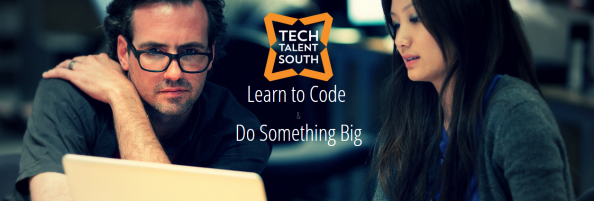What do poetry and computer programming have in common? No, this isn't the start to a schoolyard punchline. This is the question I've been asking myself lately as this is what I seem to be: a poet who likes to code.
For the last several weeks I've been attending
Tech Talent South's Code Immersion Program, which is still the hardest thing I've ever done and strangest departure from “who I am”. See, I'm a historic right brainer. I like language, movement, and metaphor. I went to college for theatre and spent 3 years of advanced study in New York. I wrote a children's novel. I'm immersed in Asheville's poetry scene.
Then how in the in the hell did I end up in the digital world, learning to code from Tech Talent South? Great question.
I think it all started when I agreed to build a simple website for
The Barleycorn, a West Asheville restaurant where I was a server. Though I had only done a few homespun sites before, I was confident I could tackle the project. And I did. Through countless Google searches, YouTube tutorials, and help chat rooms, I built a mobile-friendly, fully-responsive website in a week.
Delivering that website in a week was all about problem-solving. The learning curve was huge and there were many hiccups. All were solvable, but I had to commit to seeking answers to the roadblocks. This is a huge aspect of working with code. Error messages, broken links, and unexpected outcomes are part and parcel of a life in tech, and building great digital content is all about how you sleuth out the solution when faced with a problem.

This insistence on discovery is where my passions converge. Poetry, writing, acting, and coding all rely on this creative problem-solving. Poems and plays are built from a question, an unknown, and the artist searches for answers. Perhaps the greatest differentiation is that a poem or a play is often left searching, while code lands at a destination. A program can't run without the problems solved and the questions answered. And yet, code isn’t an unfeeling rigid structure. Just as any well-written poem or richly-conceived performance, code can be beautiful. Code can be a work of art.
How? Well, coding allows room for interpretation. There are many moments in the TTS Code Immersion Program when two students come up with different solutions to solve the same problem. The solution comes down to personal preference, individual style. Coding is as expressive as it is logical or analytical. Poetry, perhaps surprisingly, is quite technical. (In my last poetry group we discussed at length the meter of a particular line in concert with classical forms.) No matter the medium, we are
creating, and that is the true nobleness of any craft.
My director and mentor,
Kari Margolis, used to point out the magic in “making something out of nothing.” She understood the rare and precious value in creating culture as opposed to merely consuming it. In our fast-paced digital world, where there’s a device in every open palm, perhaps the greatest unifying factor of these pursuits is their defiant insistence on creation.